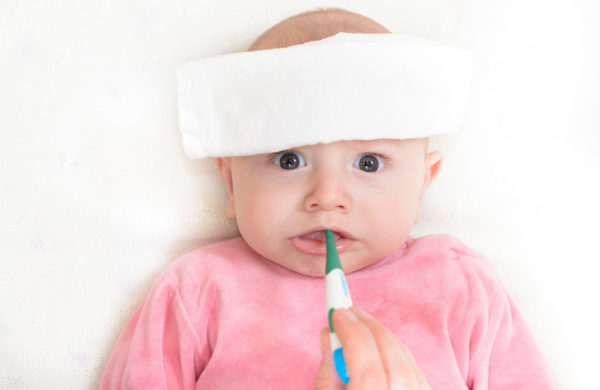
Researchers estimate roughly one-third of clinic visits and calls to pediatricians’ offices are due to fevers. Parents are understandably worried when their babies spike fevers and are fussy or irritable. But in many respects, fevers are good. Fevers are your baby’s natural response to fighting an infection. From a physiological standpoint, a fever helps the body kill bacteria and viruses that can make you sick.
However, fevers often occur without other symptoms like nasal congestion, diarrhea or vomiting, and low-grade fevers can be a side effect of teething or immunizations. Therefore, it’s difficult for many parents to determine how to treat a fever in a baby.
Treatment for Fevers in Babies
The American Academy of Pediatrics (AAP) sets forth guideline for when you should seek medical treatment for a feverish baby.
Infants younger than 6 weeks who have a fever of greater than 100.4°F should be seen by a doctor right away. Young babies can get sick very quickly and immediate medical attention is warranted. Do not give your baby acetaminophen or ibuprofen until a doctor evaluates his or her conditio
Infants from 7 weeks to 3 months who have fevers of greater than 101°F should be seen by a physician within a few hours, but not immediately. For example, if your baby spikes a fever in the middle of the night, you can wait until morning to contact the doctor unless other symptoms are present or the baby’s condition worsens.
Infants from 3 to 6 months should be seen by a doctor if they have a fever up to 102°F and they have symptoms of illness, or if they have a fever greater than 102°F with no other symptoms present.
Generally speaking, you should wait 24 hours before seeking medical attention for infants who are older than 6 months. Exceptions are:
- A fever that rises above 104°F multiple times.
- A drowsy baby who is overly fussy or looks very ill.
- A baby with a stiff neck, severe headache, severe sore throat, severe ear pain, a rash or continuous vomiting and diarrhea.
- A baby who appears dehydrated.
- A baby with a compromised immune system due to a medical condition
- A baby who has a seizure.
You should also consult a doctor if a baby under 24 months old has a fever for longer than 24 hours or a child over 2 years has a fever for longer than three days.
Treating Fever at Home
Treating a fever should result in making your baby comfortable, not necessarily returning his or her temperature to normal if the fever is mild. Over-the-counter medications can help reduce a baby’s fever so he or she feels more comfortable.
Doctors caution parents to closely follow dosing instructions to ensure babies don’t receive too much acetaminophen or ibuprofen.
Here are some other ways to help a feverish baby feel better:
- Make sure he or she drinks plenty of liquids. Water, popsicles and flavored gelatin are good options for older babies.
- Keep the temperature inside your house between 70° and 74°F.
- Dress the baby in lightweight, cotton pajamas. Too many clothes will trap heat and cause the temperature to increase.
- Allow your baby to get plenty of rest.
Things You Shouldn’t Do for a Fever
According to the AAP, parents don’t need to give children acetaminophen or ibuprofen for a fever less than 100°F unless the baby is uncomfortable. Parents also shouldn’t wake babies to administer more doses of medication, the AAP says.
Additionally,
- Never give a baby or child aspirin.
- Don’t give a baby a cold bath or use rubbing alcohol to lower a fever.
- Give your baby a dose of acetaminophen before a lukewarm bath.
Otherwise, your child may experience chills and shivering as the body tries to raise its temperature following the bath.
